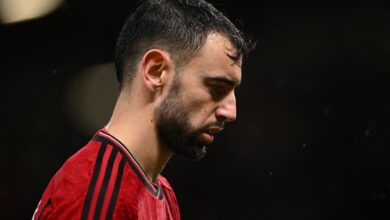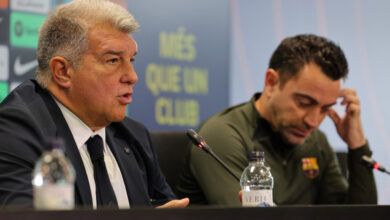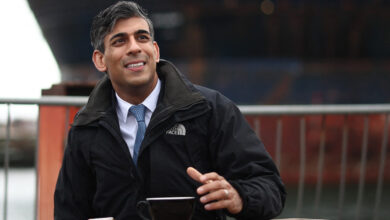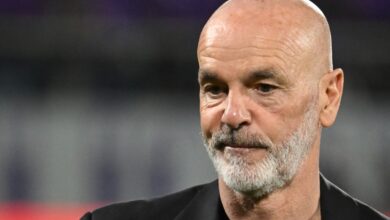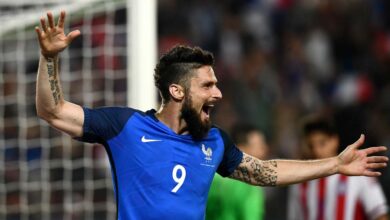How Ghana 2024 exposed Nigeria’s weak underbelly in sports devt

After independence, Nigeria was a leading force on the continent in several track and field events, which she now plays second fiddle. GOWON AKPODONOR writes that the recent 13th African Games in Ghana has again shown that Egypt, Algeria, and some East African countries have consolidated their grips where Nigeria failed to exert dominance.
Nigeria’s number one table tennis player, Aruna Quadri, looked forlorn as his archrival, Omar Assar, was being decorated with the men’s singles gold medal, at the end of their epic battle, in the final match of the just-concluded 13th Africa Games, in Ghana.
In three consecutive African Games’ table tennis finals, Assar has beaten the Nigerian, whose dream is to win the gold medal before retiring from the sport.
Egypt’s dominance in the sport was so pronounced that the country won all six gold medals at stake.
In the women’s singles event, since Edem Offiong won the title at the 2011 fiesta in Maputo, Mozambique, no Nigerian woman has won the title, which has been dominated by Egypt’s Dina Meshref.
Before the 2011 Africa Games in Maputo, Nigeria was in perfect control of women’s table tennis team event on the continent. But like other aspects of the nation’s national life, the Egyptians have taken advantage of Nigeria’s obvious lull to dominate women’s team event.
In weightlifting, which made the famed Etim ‘Ironbar’ Bassey, Oliver Orok, and Emmanuel Oshomah household names in Africa, Egypt has also overtaken the country.
Indeed, Egypt’s exploits at the last Games gave her victory in the continental fiesta by a wide margin.
Although Nigeria’s 16 gold medals in weightlifting largely contributed to her second place finish in Ghana, Egypt dominated the sport with 24 gold medals.
Four years ago in Rabat, Morocco, Egypt also beat Nigeria in the sport, and the Ghana Games just confirmed the North African country’s dominance in the event.
While Egypt has taken over table tennis and weightlifting, the East Africans, South Africa, and The Gambia have made inroads into hitherto Nigeria’s forte like the 100m, 200m and the relays races.
In Ghana, Nigeria through Tobi Amusan and Ese Brume, maintained her stranglehold in women’s 100m hurdles and long jump respectively, but The Gambia’s Gina Bass won the 100m women gold medal, an event that Nigeria used to showcase to the world, the famed Mary Onyali, Endurance Ojokolo, and Mercy Nku.


Nigeria’s Olayinka Olajide won the 200 metres silver medal behind The Gambia’s Gina Bass, who also won the 100m gold medal at the Ghana 2023 African Games.
The sprint double have been dominated by Cote d’Ivoire’s Marie-Jose Ta Lou, whose absence in Ghana paved the way for Bass to take the title.
The men’s sprint is a different matter as Kenya’s Ferdinand Omanyala, and South Africa’s Akanni Simbani have made it their exclusive preserves since OlusojiFasuba quit the scene in 2020.
So, the question is: “Why has Nigeria lost ground to other African countries in sporting disciplines that she claimed to have comparative advantage over others on the continent?”
In sports philosophy, the general believe is that if an individual fails to plan, such person is surely planning to fail.
Shortly after the 2024 ITTF World Team Table Tennis Championships (WTTTC), which took place in Busan, South Korea, former African Games champion, Edem Offiong, pressed the alarm bell saying that Nigeria’s poor outing at the event was largely due to lack of preparation.
In South Korea, Nigeria suffered early exit. While Quadri pulled out due to alleged food poisoning, the duo of Olajide Omotayo, and Bode Abiodun failed in their matches against Chinese Taipei, Madagascar, and the Czech Republic. The Nigerian team also got walked over by Japan on Day One of the competition due to late arrival.
The Nigerian women’s team finished at the bottom of their group, which had Germany, Mexico, Slovakia and Poland as they were beaten 3-0 by all four teams to be rooted to the bottom of the table.
On their part, Egypt made some progress at the tournament, in South Korea. While the Egyptian women’s team made it to the second round after finishing second in their group stage, its men’s team was able to get a 3-1 win over Thailand in their group.
All these happened between February 16 and 25, 2024, just a few weeks to the commencement of the 13th African Games.
Offiong acknowledged then that had the Nigerian team adequately prepared for the tournament, in South Korea, it would have helped to prepare the table tennis teams for the African multi-sports fiesta.
Nigeria fancied herself as the epitome of sports on the continent after the Eighth African Games victory, in 2003, the first time the nation topped the medals table at the continental games.
Since then, the Sports Ministry’s officials always assumed that Team Nigeria would dominate every sport no matter how poorly the teams are prepared.
Stakeholders blame government’s neglect of sports development for the country’s continuous slide in areas that she towered over the rest. They insist that it takes continuous and greater investments for the country to move from strength to strength.
For former world champion and Olympian, Coach Emmanuel Oshomah, Team Nigeria’s performance, in Ghana could have been different if the necessary things were done.


Tobi Amusan
In his active days as a weightlifter, Oshomah represented Nigeria at the 1984 Olympic Games, in Los Angeles, United States, the World Weightlifting Championship, in Sweden, in 1985, as well as the 1987 African Games in Nairobi, Kenya, where he distinguished himself, winning two gold, and one silver medals, and also setting a new African record in the process.
Speaking with The Guardian, Oshomah, who is the proprietor of Oshobugie Weightlifting Academy in Auchi, Edo State, asked: “When last did a sport federation hold a national championship for all the athletes? But the Egyptians that we are looking at now have continuous training programmes for the different sports federations.
“The Nigeria Weightlifting Federation (NWF) does not even have a training facility anywhere in the country, where discovered athletes can be prepared under continuous supervision when they are out of camp.”
Oshomah, who used weightlifting to illustrate his point, added that the country has reached a point where almost every board member desires to be president of a federation because they know there would always be Federal Government subvention. It also gives them the opportunity to become members of their international bodies, he added.
“How are we sure we presented our best athletes in Ghana? Take weightlifting that did better than other sports as an example. The last time that our weightlifters had a National Championship was in Ibadan, in 2015. Those who missed out at that competition due to illnesses, or other reasons have never had a second chance to prove themselves.
“How many board members of the federations are contributing to the development of their sports? Don’t they leave that to the president to do alone? Some even become liabilities to the president, depending so much on money borrowed by president to fund training/preparation camps for their athletes towards a competition.
Coach Daniel Etsebiminor, who has produced many track and field stars for the country in recent years, told The Guardian from his base in Sapele, Delta State, that Team Nigeria needs to go back to the grassroots to stabilise and prepare well for future challenges.
“Our sporting circle is dead because there are no grassroots competition anymore,” he said, asking, “where are the school sports festivals and other cadet championships? They are all gone. Money allocated for sports is being used for other things, and coaches and athletes are no longer encouraged. Nigeria is the only county I see where athletes are the ones that are preparing themselves for major competitions. There are no more long, closed camping. What we do now is to call athletes to camp just two weeks ahead of major competitions.
“Other countries are building High Performance Centres, where athletes are trained to become future champions. So, we need to move fast,” Etsebiminor stated.
Some sports analysts argue that since the late 1990s, politics and government’s apathy towards sports development has affected the growth, and capacity of some sports federations to deliver.
A member of the Athletics Federation of Nigeria (AFN) board, who pleaded anonymity, blamed sports decline in the country on her inability to turn the huge talent pool into a burgeoning collection of world beaters, stressing that serious countries develop programmes that ensure that budding talents find opportunities to hone their skills, and become international athletes.
He, however, disagreed with the notion that the sprints belong to Nigeria, saying that it was only in recent times that the country dominated the event.
According to him, Ghana dominated the short sprints before Nigeria took over in the 1970s up to the 1990s, while Kenya dominated in the 400m before the advent of Innocent Egbunike and his group.
“If you have good plans to harness your talents, you will develop world beaters. The United States dominated the sprints until Jamaica found a way of raising world-class stars.
“For some time now, Kenya and South Africa have been in control of the sprints because they created and sustained a system that has given them top stars in the events.”
He averred that the major problem that Nigeria has is that “we are not producing enough athletes, especially at secondary school level, and that has disrupted the supply chain.
“Even the few that came through did not get enough support from the federations. Sadly, athletics is still being treated as a recreational sport by government at all levels. Unless and until we treat it as a business where it becomes a profession of its own, we will continue to grope in the dark.”
The AFN official noted that Nigeria needs to invest, and develop athletes in more disciplines to catch up with, and possibly overtake Egypt, adding that the country has the human capital to realise such dreams.
“Let the Olympic Games be our standard. If we want to catch up with Egypt, we must do the needful; develop sports that are medal-spinning. How do you concentrate on team sports, especially football and expect to win global championships? We need to start investing in sports like swimming, gymnastics and fencing etc., to compete with the likes of Egypt.
“The medals in swimming and fencing alone dwarfs whatever number of events that we participate in,” he said.


